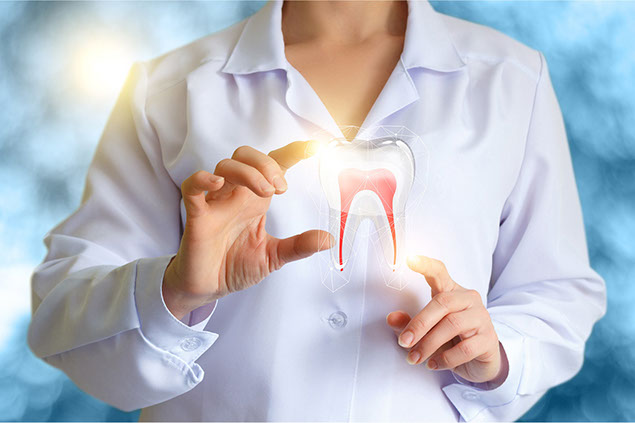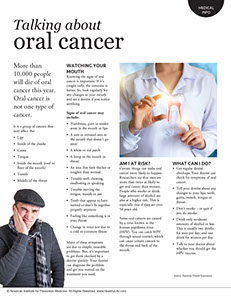SYMPTOM CHECKER
CONDITIONS
Male
Female
Child
Arm, Hand & Shoulder Concerns
Legs & Feet Concerns
Dental & Mouth Concerns
Ear & Nose
Eye Conditions
Head Conditions
Arm, Hand & Shoulder Concerns
Legs & Feet Concerns
Front
Back
Arm, Hand & Shoulder Concerns
Dental & Mouth Concerns
Ear & Nose
Eye Conditions
Head Conditions
Arm, Hand & Shoulder Concerns
Dental & Mouth Concerns
Ear & Nose
Eye Conditions
Head Conditions
Front
Back
Arm, Hand & Shoulder Concerns
Neck Links
Head & Neck Concerns
Arm, Hand & Shoulder Concerns
Neck Links
Head & Neck Concerns
Front
Back
Online Clinic
Wise Healthcare
Talking about oral cancer

Print on Demand
More than 10,000 people will die of oral cancer this year. Oral cancer is not one type of cancer.
It is a group of cancers that may affect the:
• Lips
• Inside of the cheeks
• Gums
• Tongue
• Inside the mouth (roof or floor of the mouth)
• Tonsils
• Middle of the throat
Watching your mouth
Knowing the signs of oral cancer is important. If it’s caught early, the outcome is better. So, look regularly for any changes in your mouth and see a dentist if you notice anything.
Signs of oral cancer may include:
• Numbness, pain or tender areas in the mouth or lips
• A sore or irritated area in the mouth that doesn’t go away
• A white or red patch
• A lump in the mouth or throat
• An area that feels thicker or rougher than normal
• Trouble with chewing, swallowing or speaking
• Trouble moving the tongue, mouth or jaw
• Teeth that appear to have moved or don’t fit together properly anymore
• Feeling like something is in your throat
• Change in voice not due to a cold or common illness
Many of these symptoms are due to simple, treatable problems. But, it’s important to get them checked by a dentist quickly. Your dentist can diagnose the problem and get you started on the treatment you need.
Am I at risk?
Certain things can make oral cancer more likely to happen. Researchers say that men are more than twice as likely to get oral cancer than women. People who smoke or drink large amounts of alcohol are also at a higher risk. This is especially true if they are over 50 years old.
Some oral cancers are caused by a virus known as the human papilloma virus (HPV). You can catch HPV through sexual contact, which can cause certain cancers in the throat and back of the mouth.
What can I do?
• Get regular dental checkups. Your dentist can check for symptoms of oral cancer.
• Tell your dentist about any changes to your lips, teeth, gums, mouth, tongue or throat.
• Don’t smoke – or quit if you do smoke.
• Drink only moderate amounts of alcohol or less. This is usually two drinks for men per day, and one drink for women per day.
• Talk to your doctor about whether you should get the HPV vaccine.
Source: American Dental Association
This website is not meant to substitute for expert medical advice or treatment. Follow your doctor’s or health care provider’s advice if it differs from what is given in this guide.
The American Institute for Preventive Medicine (AIPM) is not responsible for the availability or content of external sites, nor does AIPM endorse them. Also, it is the responsibility of the user to examine the copyright and licensing restrictions of external pages and to secure all necessary permission.
The content on this website is proprietary. You may not modify, copy, reproduce, republish, upload, post, transmit, or distribute, in any manner, the material on the website without the written permission of AIPM.
2021 © American Institute for Preventive Medicine - All Rights Reserved. Disclaimer | www.HealthyLife.com
















































